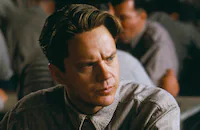Dead Man Walking

Brief Synopsis
Cast & Crew
Tim Robbins
Cortez Nance
Mary Robbins
Steve Boles
Gary Boe
Adrian Colon
Film Details
Technical Specs
Synopsis
Honoring the request of a lonely and desperate man, Sister Helen Prejean writes to Matthew Poncelet, the condemned killer of two teenage lovers, and is wholly unprepared for the relationship which will follow. When the date is set for Matthew's execution, he asks Sister Helen to be his spiritual advisor and she complies. As she comes to see the terrified human beneath Matt's brash, unrepentant facade, Sister Helen becomes increasingly disturbed, not only by the terrible anguish he suffers during the long countdown, but by the rage of the victims' families, who seek retribution for their unbearable loss. With his scheduled execution fast approaching, she struggles for the life, the dignity, and the soul of a confused and angry man. In the end, it is her faith and her fierce courage that sustains her when she stands with Matthew and with the victims' families.
Director

Tim Robbins
Cast
Cortez Nance
Mary Robbins
Steve Boles
Gary Boe
Adrian Colon
Pamela Garmond
Roberta Maxwell
Jenny Krochmal
Jack Henry Robbins
Ray Aranha
Walter Breaux
Lenore Banks
Seamus Egan
Peter Sarsgaard
Derek Steeley
Steve Carlisle
Marlon Horton
Dennis Neal
Barton Heyman
Timothy Metzger
Robert Prosky
Adele Robbins
Celia Weston

Lois Smith
Adam Nelson
Amy Long
Missy Yager
Joan Glover
Jeremy Knaster
Florrie Hathorn
Arthur Bridgers

Susan Sarandon

Scott Wilson
Eugene Moye

Joel Diamond
Palmer Jackson
Erik Friedlander
Scott Sowers
Johnathan Thomas
Jon Abrahams
Raymond J Barry
Larry Pine
Dalvin Ford
Clancy Brown
Sally Ann Roberts
Kenitra Singleton
Idella Cassamier

Jack Black
Pete Burris
Mino Cinelu
Helen Hester
Miles Guthrie Robbins
Margaret Lane
Margo Martindale
Gil Robbins
John Hurlbutt
Kevin Cooney
Patrick Mcguire
Alec Gifford
Eva Amurri Martino
John Wilmot
Michael Cullen
Nesbitt Blaisdell
Frederick Zlotkin

Sean Penn
Molly Bryant
Mike Longman
Farrukh Fateh Ali Kahn
Crew
Danielle Acarino
Greg Addison
Douglas Aibel
Christie Alexander
Farrukh Fateh Ali Kahn
Rahat Ali Kahn
Lawrence Amanuel
Barry Jean Ancelet
Amina Annabi
Peter Aquino
Sallie Jones Arata
Lee Arenberg
Tony Arnaud
Scott August
Lucian Baran
Markus Barben
Elven Barrow
Jason Barry
John Beal
Ned Bellamy
Debbie Berins
Martin Bernstein
Jordan Beswick
Tim Bevan
Michael Bigger
Jack Blanchard
Susie Blanchard
Brigid Boden
Harry Peck Bolles
Bill Borges
Sharon Boyle
Brian Brophy
Clancy Brown
Robin Brown
Edward Brumfield
Molly Bryant
Eva Z. Cabrera
Burl Cain
Sal Camacho
David Richard Campbell
Kimberly Carbo
Marilyn Carbone
David Carmel
Gayle Carpenter
Buddy Carr
Cynthia Carriere
Sam Caruso
Steve Castellano
Greg Cattano
Frank Centeno
Kayla Chaillot
Agnès Challe-grandits
Holly Cherry
Gary Chester
Gary Chester
Rashid Chinchanwala
Lisa Zeno Churgin
Anthony Ciccolini
Mino Cinelu
Malcolm Clay
Sam Cohn
Greg Collins
Adrian Colon
Ry Cooder
Ry Cooder
Cindy Cook
Vicki Cosentino
Pierce Cravens
Maureen Crowe
Michael Curry
Julie Daggett
David Daugherty
Roger Deakins
Roger Deakins
Kevin Deas
Rashid Ahmed Din
Rick Dior
Scott Dior
Christina Donatelli
Arlene Donovan
Kim Marie Druce
David Dusing
David Dusing
Cougar Easley
Michele Eaton
Seamus Egan
Deana Elwell
Glen Engels
Kris Enos
Donald Everard
Jerry Everett
Jeremy Fader
Eric Fellner
Abby Fender
David Filippi
Norwood Fisher
Phillip Fisher
John Fitzpatrick
Sister Lillian Flavin
Richard Ford
Jeff Foster
Brad Fox
Charlie Franklin
Ralph Fratianni
Jane Frazer
Bonnie Friedman
Laurie Friedman
Charley Furey
Peter Gabriel
Lisa Gaede
Kyle Gass
Barry Gastealu
Shelley Geiler
Rebecca Gibson
Chris Gilmer
Adam Gilmore
Michele Giordano
Harvey Goldberg
Elaine Goldsmith-thomas
Allison Gordin
Jonathan Graham
Peter Graves
Brad Gremillion
Huey Grey
Joe Grimaldi
Joe Grimm
Juliet Haffner
Juliet Hafner
Bruce Hamme
Dana A Handy
Randy Hansen
Ken Hardy
Andy Harris
Samantha Hart
Nancy Hartman
Nadine Hasan
Gretchen Hatz
Gerry Hawkins
Hilary Hawkins
Davis Hawn
Allison Hebble
Allison Hebble
John Hebert
Barbara Heller
Ken Hertz
Alix Hester
Dionna Hickman
Eugene J Hines
Aldis Hodge
Edwin Hodge
Sam Hoffman
Bradford L Hohle
Joel Holland
Rachel Holroyd
Hyatt Hood
Richard Hoover
Lys Hopper
Elston Howard
Michael Huhn
Jimmy Humphreys
Delroy Hunter
Earl R Hurst
Dildar Hussain
Ron James
Kristen M Johnson
Elton Jones
Julianne Jordan
Coril Joseph
Malcolm Joseph
Steven Josephs
Renee Ehrlich Kalfus
Richard S Kamin
Henry Kaplan
Brian Kasch
Dr. Dr Katz
Nicole Kazdin
Michael Kelly
Nusrat Fateh Ali Khan
Jon Kilik
Tracy Kilpatrick
Genevieve King
David Klotz
Jeremy Knaster
Nancy Kriegel
Michael Kriston
Karen Krueger
Phyllis Jo Kubey
Loney Landry
Bonney Langfitt
George Lara
Israel Larios
Clare Larson
Chris Lechler
Phillis Lehmer
Barry Levine
Hal Levinsohn
E J Levron Jr.
Mitch Lillian
Gale Limansky
Melissa Logan
Film Details
Technical Specs
Award Wins
Best Actress
Award Nominations
Best Actor
Best Director
Best Song
Articles
Dead Man Walking
Penn's character is actually an amalgamation of two real-life condemned men, Elmo Patrick Sonnier and Robert Lee Willie, who were both executed within months of each other for separate murders. Prejean began her prison ministry in 1981. Through that activity she began writing to prisoners, eventually meeting Sonnier and Willie and tending to their spiritual needs. Her experiences with them led to her conviction that the death penalty is morally wrong.
After making his directorial feature debut with the political satire Bob Roberts (1992), Tim Robbins took a great leap with this intriguing, complex drama that was highly praised for its quiet courageousness and humanistic message about compassion, redemption, and forgiveness. The film received glowing reviews, not least for the riveting performances of Sarandon and Penn. In particular, Penn's work goes against the grain of sympathy, and critics noted that the actor and director do not take the easy route of trying to make the character likable or relatable while still driving home the courage of Prejean's belief in the value of saving every soul.
Although the men in Prejean's book were electrocuted, she and Robbins agreed the better approach in the movie would be to show Poncelet's death by lethal injection. In an interview, Prejean stated, "We don't want to give people the moral out whereby people could say 'Oh well, we used to do electrocution but that's too barbaric so now we are humane and inject them.'"
This was the second of three films in which Robbins directed his longtime partner Sarandon, from which he separated in 2009. It is, however, her only starring role under his direction, having played smaller parts in the ensembles of Bob Roberts and Cradle Will Rock (1999). Her work as Prejean earned her a fifth Best Actress Academy Award nomination and her first win to date. Penn was also nominated (along with Robbins and Bruce Springsteen for the title song). A few years later, both Penn and Robbins appeared together in Mystic River (2003) and were honored by the Academy for their work.
The film was shot on location almost entirely in Louisiana, including the state penitentiary in Angola. In addition to Sarandon and Robbins' two young sons, the cast included Robbins' father, mother, and sister in small roles. Prejean made a cameo appearance as a woman at an anti-death penalty vigil.
The director's brother, David Robbins, composed the score. The soundtrack also included songs by Johnny Cash, Nusrat Fateh Ali Khan and Eddie Vedder. A soundtrack released in 1996 also included songs inspired by the movie (but not featured in the film) by Patti Smith, Tom Waits, Lyle Lovett, Steve Earle, Mary Chapin Carpenter, Michelle Shocked, and Suzanne Vega.
In 2002, Robbins adapted his screenplay for a stage version. Rather than seek a professional production, he made the play available to schools and colleges with the stipulation that two or more academic departments incorporate death penalty issues in their curricula for at least one semester. Prejean's book also inspired an opera by Jake Heggie with libretto by award-winning playwright Terrence McNally. It premiered at the San Francisco Opera in 2000.
As affecting as the film is, it does not appear to have inspired much change in the practice of capital punishment in the U.S. According to Yvonne Koslovsky-Gola in her book The Death Penalty in American Cinema: Criminality and Retribution in Hollywood Film, public debate on the issue did rise for a time after the film's release but did not immediately bring about significant change beyond encouraging more academic study.
Prejean has continued her work with prison reform. She has been on the board of the National Coalition to Abolish the Death Penalty from 1985-1995, serving as chair from 1993 to 1995. She is also an honorary member of Murder Victim Families for Reconciliation, a member of Amnesty International and is presently the Honorary Chairperson of Moratorium Campaign. Prejean also advocates for and counsels death row inmates and families of murder victims as the founder of Survive.
Director: Tim Robbins
Producers: Tim Bevan, Eric Fellner (executive producers); Jon Kilik, Tim Robbins, Rudd Simmons
Screenplay: Tim Robbins, based on the book by Helen Prejean
Cinematography: Roger Deakins
Editing: Lisa Zeno Churgin, Ray Hubley
Art Direction: Tom Warren
Music: David Robbins
Cast: Susan Sarandon (Sister Helen Prejean), Sean Penn (Matthew Poncelet), Robert Prosky (Hilton Barber), Raymond J. Barry (Earl Delacroix), R. Lee Ermey (Clyde Percy), Celia Weston (Mary Beth Percy), Margo Martindale (Sister Colleen)
By Rob Nixon

Dead Man Walking
Quotes
Trivia
Miscellaneous Notes
Winner of the Silver Bear Award for Best Actor (Sean Penn) at the 1995 Berlin International Film Festival.
Tim Robbins and John Kilik were nominated for the 1995 Golden Laurel Award by the Producers Guild of America.
Released in United States Winter December 29, 1995
Expanded Release in United States January 5, 1996
Expanded Release in United States January 12, 1996
Expanded Release in United States January 19, 1996
Wide Release in United States January 26, 1996
Expanded Release in United States February 2, 1996
Expanded Release in United States February 9, 1996
Released in United States on Video June 25, 1996
Released in United States February 1996
Shown at Berlin International Film Festival (in competition) February 15-26, 1996.
Second film for actor-director Tim Robbins, who marked his feature directorial debut with "Bob Roberts" (USA/1992).
Completed shooting June 30, 1995.
Began shooting April 24, 1995.
Released in United States Winter December 29, 1995
Expanded Release in United States January 5, 1996
Expanded Release in United States January 12, 1996
Expanded Release in United States January 19, 1996
Wide Release in United States January 26, 1996
Expanded Release in United States February 2, 1996
Expanded Release in United States February 9, 1996
Released in United States on Video June 25, 1996
Released in United States February 1996 (Shown at Berlin International Film Festival (in competition) February 15-26, 1996.)














